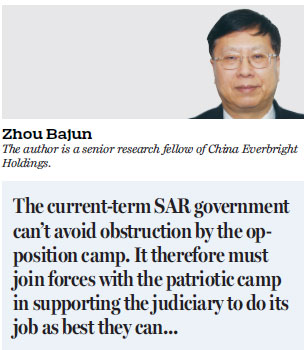Hong Kong has rule of law and consensus on development
Updated: 2017-09-06 07:51
By Zhou Bajun(HK Edition)
|
|||||||||
Two recent developments in Hong Kong gave people hope. One is the judiciary handling a series of cases involving political figures according to existing laws, including six opposition politicians disqualified as lawmakers for violating the Basic Law and relevant Hong Kong law while taking the Legislative Council oath last October and three young activists sentenced to six, seven and eight months in prison respectively for criminal offenses in 2014. The other is Chief Executive Carrie Lam Cheng Yuet-ngor appointing 22 non-official and eight official members to the Task Force on Land Supply, tasked with providing macro land supply recommendations for the government with an eye on land-supply sources and public feedback.
The series of court cases involving political figures indicates that in the past 20 years Hong Kong's judiciary has developed its own overall concept of maintaining law and order in the context of "one country, two systems" - keeping the traditional rule of law adopted under the British administration in place while upholding the new judicial structure built in accordance with the Basic Law. As a result the special administrative region's judiciary has begun forming its own judicial tradition with distinct SAR characteristics.
To the opposition camp, especially the radical faction, Hong Kong's new judicial structure and practice are unacceptable because they are only familiar with the old ones. Neither do they appreciate the need for new judicial structure and practice after the city's constitutional status completely changed. Nevertheless, there is nothing they can do to change reality, except violating existing laws and challenging the judiciary for all the wrong reasons. They have been particularly misguided in challenging the sovereign rule and Hong Kong law with such excuses as "civil disobedience", without realizing they are destroying the old tradition as well as the new order.

After the courts made decisions in the above-mentioned cases some people accused the judges of trying to protect those vested interests. They believe the defendants broke the law to push forward political reform and/or progress, while ignoring the fact that the rule of law and "one country, two systems" principle protect the overall interests of Hong Kong society, including development and progress. Those critics seem to have forgotten why the Basic Law stipulates that Hong Kong's existing social system and lifestyle would remain unchanged for 50 years after 1997. It is intended to protect the overall interests of Hong Kong society, including their own vested interests, of course.
As such it is fair to say Hong Kong has now found the crucial means to ensure stability, which relies on effective rule of law, including an independent and efficient judiciary. However, stability alone cannot sustain development, which requires another crucial assurance - consensus. By appointing the land-supply task force, the CE has taken another step toward resolving one of the biggest obstacles in the way of Hong Kong's socio-economic progress - inadequate developable land.
Admittedly this is not the first time the SAR government has appointed a task force to tackle a particular public policy issue but the land-supply task force will not work on its own all the time. It will also join the public in discussing related matters, which is a first in Hong Kong's public policy history.
Some people may remember the Committee on Governance and Political Development (CGPD), a research body under the Commission on Strategic Development of the Central Policy Unit, which studied the feasibility of a roadmap for implementing universal suffrage with simultaneous public consultation during the third-term SAR government. Wasn't it the first of such discussions?
Yes and no. Yes because the CGPD's research included a roadmap for implementing universal suffrage; and no because conducting public consultation was not its responsibility back then. This time the new CE appointed the task force with consulting the public in its job description, along with research. The task force will bring in the whole Hong Kong society on studying land-supply issues in an open and interactive fashion. This is an important move suited to Hong Kong's reality which the SAR government never attempted before.
Currently the opposition, especially the radical faction, is trying to have Hong Kong society spend all its waking hours on endless political infighting. So much so that many local residents have lost confidence in the future. The community must refocus on the economy and livelihood issues as soon as possible to help society find its confidence again. Otherwise Hong Kong's development will never be smooth. Short supply of land is one of the main causes of soaring housing prices and rentals and finding an early solution to this nagging problem is one of the toughest issues Hong Kong must address now and at least another decade or two down the road.
The opposition camp and radical faction in particular won't watch Hong Kong society refocus on the economy and livelihood issues without trying to distract it. And the opposition as a whole will succumb to pressure from the radical faction whether they like it or not, because the latter never follows rules or takes "no" for an answer. The current-term SAR government can't avoid obstruction by the opposition camp. It therefore must join forces with the patriotic camp in supporting the judiciary to do its job as best they can, so the government can focus on the economy and livelihood issues.
(HK Edition 09/06/2017 page8)